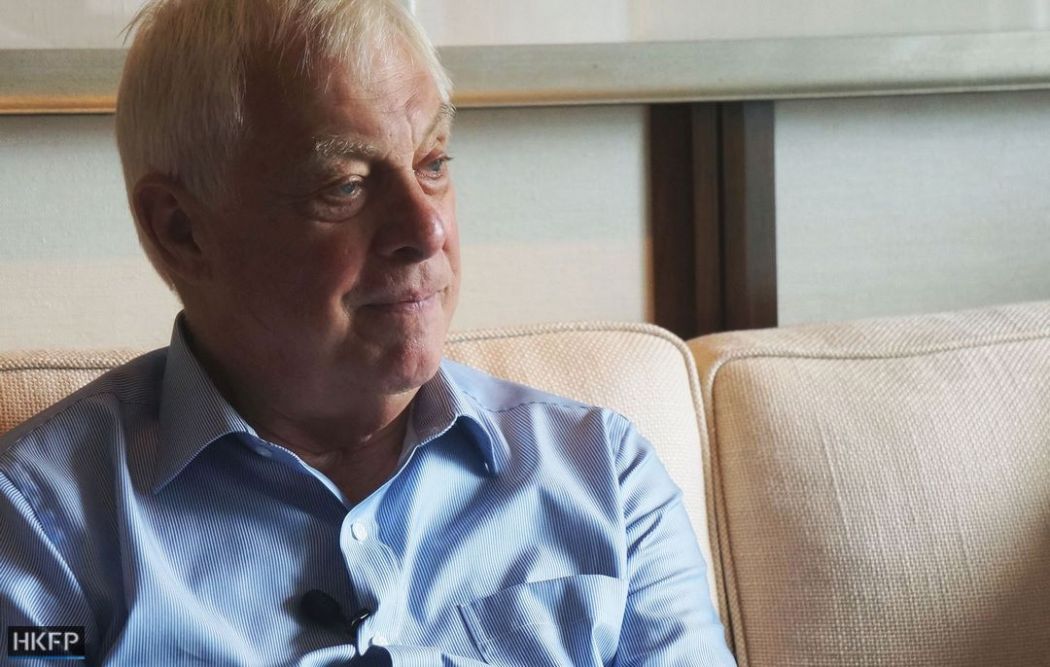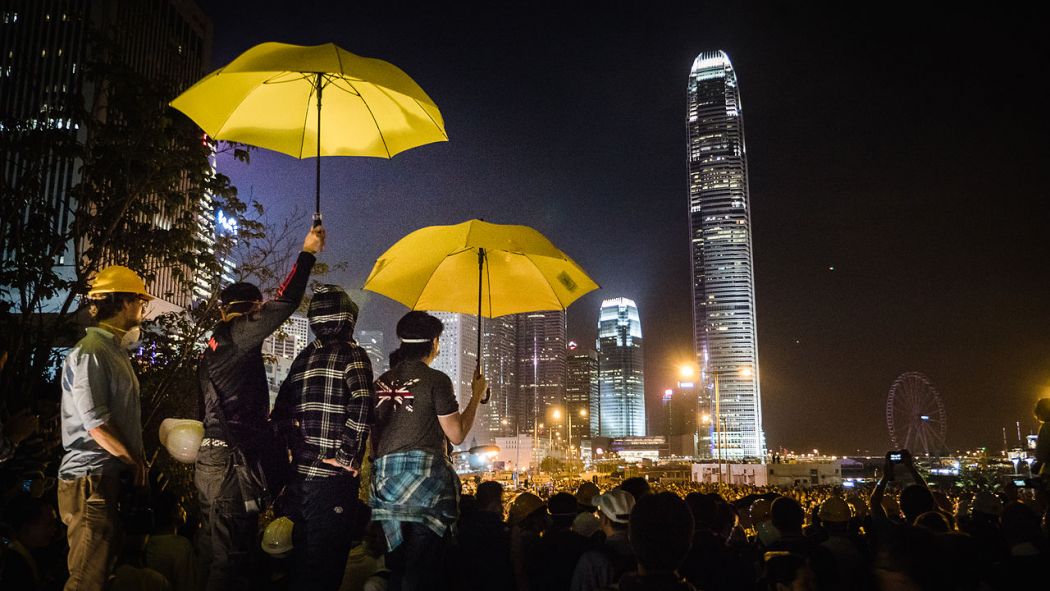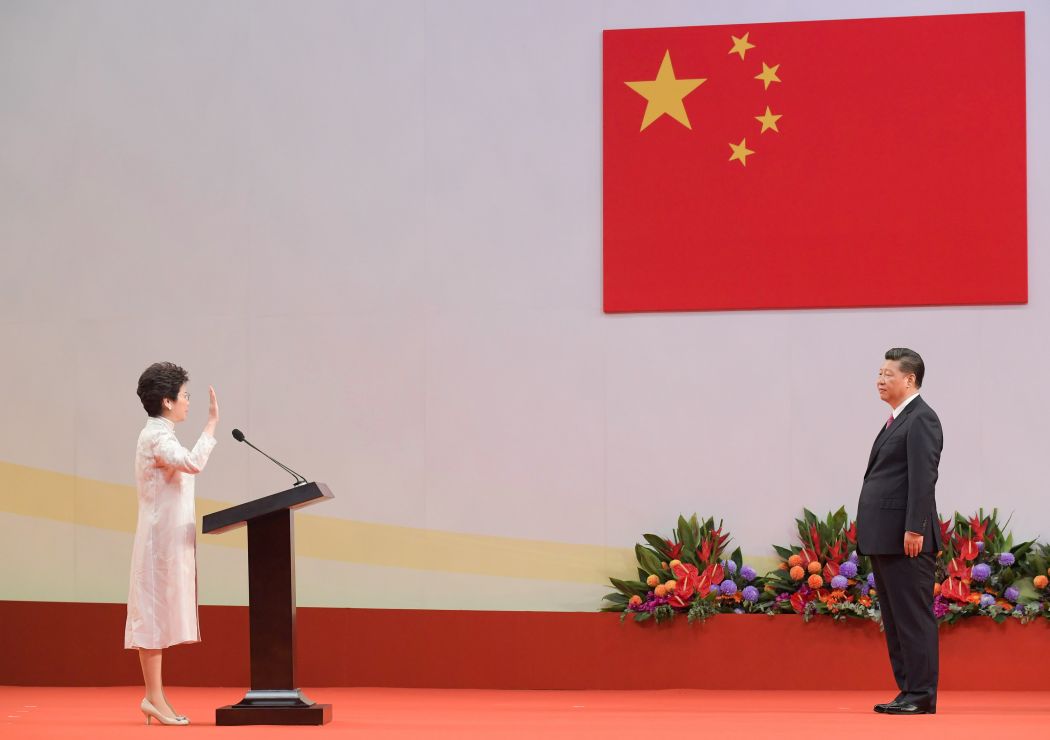
Hong Kong’s last governor Chris Patten tried, and yet ultimately failed, to leave behind a democratic system after the city’s 1997 handover to China – all whilst under massive pressure from Beijing.
Patten took up his post as governor in 1992, at a time when the city’s future had been sealed through the Sino-British Joint Declaration, which was signed eight years earlier. But he says he did not want to be “London’s puppet in Hong Kong,” adding that – even nowadays – chief executives will always need to stand up to Beijing, to tell them what is good for Hong Kong rather than what they want to hear.
“Hong Kong is a fantastic city, you know, it’s one of the freest cities in Asia still, people in Hong Kong have a real sense of citizenship which involves pride in what has been achieved here… And I think that the things Hong Kong stands for are going to be the heart of a lot of debates in the 21st century,” he told HKFP.

Under the “One Country, Two Systems” framework, Hong Kong enjoys freedoms that are not allowed in other mainland Chinese cities, but the UK recently said important areas were “coming under increasing pressure.”
Patten often praises the city’s pluralism where diversity can be freely embraced. However, he says it can easily come under threat: “It’s threatened usually by those who are nervous about the public, the people developing their own idea of citizenship, and in which they have the right to ask the government difficult questions. It’s not surprising that the less plural the society, the more corrupt it is.”

Democracy fast-track
Reflecting on his tenure in the 90s, he expressed admiration for Hong Kong as a trade hub and for its economic openness: “The politics was always slightly behind. That was something which Britain was largely responsible [for] in the 1980s, when we should have developed democracy rather faster.”
“But I think there is, deep in people’s DNA in Hong Kong, an understanding of the relationship between economic and political freedom – which I hope will sustain Hong Kong in the years ahead.”
Patten’s own democratic reform proposal in 1995 – a progressive plan to reform the functional constituencies of the legislature which were controlled by industry sector groups – was short-lived. Beijing decided to form its own Provisional Legislative Council in Shenzhen and repealed any undesirable advancements after it took control in 1997.
He quotes economist Milton Friedman as saying that “One Country, Two Systems” was an oxymoron: “But that was the deal offered to Hong Kong, and the real question is whether it continues to be two systems, or whether it declines to one-and-third-quarters, or one-and-a-half, or one-and-an-eighth. And that’s the challenge in the next few years.”

“I think that one of the things which has cast shadows over it is that – while ‘One Country, Two Systems’ is constantly being asserted by Chinese leaders, they have very rarely tried to understand what the Hong Kong system actually is. It’s not just the capitalist allocation of resources, it’s also been about all these other freedoms. And to hear some Chinese officials talking about the law – [it] does remind one that what they actually mean is rule by law, not rule of law.”
But Patten says he does not believe the claim that there is no rule of law without democracy: “Though sooner or later, people will want both.”
Standing up to Beijing
For many Hongkongers, Patten’s most famous quote was uttered during his last policy address to the legislature in October 1996: “My anxiety is not that this community’s autonomy would be usurped by Peking, but that it could be given away bit by bit by some people in Hong Kong.”
During times of political anxiety, internet memes featuring the quote are often shared across social media – a phenomenon which appears to amuse Patten: “I am quite struck by the fact that a lot of people who do that, and who quote me, weren’t even born when I was here – or were in elementary school. So it’s quite humbling. I think it was true then, and it’s true today.”

He says that, at the time, some people would question whether his administration was seeking advantages for London. They would try to persuade Chinese officials that he was attempting to leave behind tremendous debts for Hong Kong, he says.
“And then there were others who thought that the right way to deal with Communist officials was to tell them what they wanted to hear, rather than what was good for Hong Kong,” he adds.
“I’ve always thought that just as when I was governor, I was very keen to be Hong Kong’s – as it were – representative to London and Beijing, rather than London’s puppet in Hong Kong. And I think the same is true for the chief executive, sooner or later, in order to sustain the support of people in Hong Kong. A chief executive will always need to stand up to Beijing.”

Hong Kong’s leader is now chosen by a 1,200-member election committee largely controlled by Beijing. This year, the China Liaison Office – Beijing’s organ in Hong Kong – was criticised for actively supporting Carrie Lam in her bid for Hong Kong’s top job.
‘Moral high ground’
Patten says his first visit to Hong Kong was in 1979, when he was still a backbencher in Parliament. He wrote an article in the Guardian entitled Pulling the Dragon’s Teeth for Hong Kong, suggesting that the colony start developing democracy in local government.
“The then-governor, who was an extraordinary magisterial figure, did a great deal of good in Hong Kong, housing and so on… Lord MacLehose was quite cross with my article because he didn’t think that Hong Kong was right for democracy, that it would annoy the mainland Chinese.”
“What has changed over the years is that an increasingly well-educated population understands that if you can choose what car you are going to earn, or which way you’ll travel to work, or what you’ll do in the weekend, why can’t you choose your government? Why can’t you have a greater say in the way your society is run, and I think that’s an unstoppable process.”

Patten wrote in his new book First Confession: A Sort of Memoir that most of the world – except in China where the news was blocked – watched the pro-democracy Umbrella Movement in 2014 with surprise and admiration of the courtesy and restraint shown by young people.
He was keen to urge activists to claim the moral high ground gained after the movement, but equally firm on stating his opposition to recent calls for independence.
“Hong Kong is not a nascent state, it’s a free city, but it’s part of China,” he says.”Even though it wasn’t part of Chinese sovereignty for so many years.”
“It will dilute the support for democracy… people in Hong Kong are not going to believe that is a sensible or possible outcome,” he added. “I think it provokes the worst sort of reactions – not just in the Communist Party in the mainland – but I think because individual Chinese don’t know really what Hong Kong is like, I think it probably provokes antagonistic sentiments there as well. I just think it is counterproductive.”

‘A degree of faith’
Recently, a court sentenced 16 activists to jail for participating in relatively peaceful demonstrations. As the government sought to pursue the cases until the activists were imprisoned, the moral high ground may not seem so inviting to young Hongkongers.
But Patten disagrees, saying that it takes a “degree of faith” to continue dialogue.
He adds that, during his visit last year, he spoke to students at the University of Hong Kong about the city’s future. Activist Joshua Wong and his colleagues had invited him to speak, though he says he did not completely agree with Wong’s viewpoints: “I am not sure I convinced them, but we actually had a perfectly rational discussion… I am not sure anybody in the last year has done anything similar.”

In his latest memoir, he says that chief executive candidate John Tsang was plainly flawed in the eyes of Beijing as he had “advocated dialogue with the democracy activists.” Tsang, who was Patten’s private secretary when he was governor, had enjoyed double the amount of public support than Carrie Lam received.
“[A]fter the demonstration in 2014, the idea of closing down any communication with the people who have been demonstrating struck me as being extremely unwise. At the very moment when after the dust is settled, you should have actually been opening a discussion about the way Hong Kong is run.”
“It seems to me that there should have been enough elbow room to move things along,” he adds.

Grit in the oyster
Allowing breathing room for the city was a hot topic long before Beijing sought to tighten its grip in recent years. Declassified documents from the UK’s Foreign and Commonwealth Office state that the city was once nicknamed “Republic of Hong Kong” in light of its high degree of autonomy.
“I think that there were people at the Foreign Office who regarded Hong Kong as ‘awkward,’ because it complicated the relationship with China,” Patten says. “There was a time when it was said that the governor of Hong Kong was almost the least popular person in the Foreign Office. It shows, among other things, a misreading of China.”
“Now it’s perfectly true that Chinese officials, Zhou Enlai for example, argued against Hong Kong having greater democracy, because he and the Chinese Communist Party thought that if you gave Hong Kong greater democracy, it would sooner or later think it was going to be becoming independent country like others in the Commonwealth like Singapore or so, but that was never going to be the outcome.”

“It was always the argument about democracy as sort of grit in the oyster, but I don’t think the government should have allowed that consideration to have undermined its obligations to the people in Hong Kong.”
“The more I learn, the more I know about Hong Kong’s history, the more I am sure we should have behaved a little more robustly when it came to the relationship with China.”
Patten says that Hong Kong people around the world should stand up for the city’s interest “whenever they think that China is going back on what it’s promised, going back on the Joint Declaration and the pledges made there.”
“I think, in a lot of respects, the way China handles Hong Kong is a test case for how much China will be trusted in the next few years. And I think that’s something that which Britain, America, Germany, other European countries and countries in Asia should make clear: If China breaks what is a treaty lodged at the United Nations which goes on till 2047, if it breaks its word in that treaty, where will it break its word again?”
“And what happens after 2047? Well, the people will decide that are the people who are demonstrating at the moment at universities and – unfortunately, in some cases – are in prison.”
First Confession: A Sort of Memoir, is available now via Book Depository.

